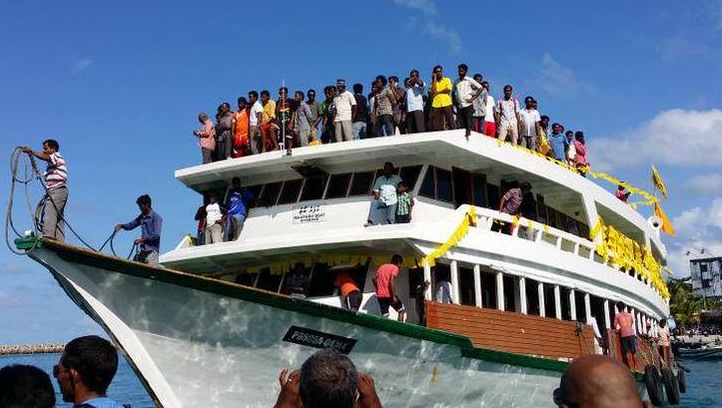An online petition has been launched calling for ruling party MP Riyaz Rasheed to publicly apologise for saying “islanders” will not be allowed to come to protest in Malé.
The main opposition Maldivian Democratic Party (MDP) estimates about 7,000 people traveled to the capital from across the country to participate in the May Day mass anti-government demonstration.
“Raajje therey meehun [islanders] will no longer have the opportunity to come to Malé, protest on the streets of Malé, assault and harm police,” the Progressive Party of Maldives (PPM) MP for Thaa Vilifushi tweeted on Thursday.
“Islanders cannot come to protest in Malé anymore. The security forces will not give that opportunity anymore,” he tweeted yesterday.
Boatloads of opposition supporters converged on Malé on May 1 for the largest anti-government protest in over a decade.
Nearly 200 people were arrested following a police crackdown on the 20,000-strong protest march. Police used tear gas, stun grenades, pepper spray and baton charges to disperse protesters when they attempted to enter the restricted Republic Square. Dozens of protesters were injured in clashes and a Specialist Operations (SO) police officer was severely beaten.
The opposition ‘Maldivians against tyranny’ alliance has since announced that it is planning to stage another mass demonstration in Malé.
Riyaz’s tweets has sparked an outcry on social media with many Twitter users referring to constitutional rights to protest and travel within the Maldives.
However, the lawmaker remains defiant in the face of the public outrage, saying the constitutional provisions do not allow “arson and beating police.”
“No matter how angry MDP gets, islanders should not be allowed to come to protest and create turmoil in Malé,” the PPM parliamentary group deputy leader tweeted last night.
The controversy comes ahead of a by-election due to take place on June 6 for the vacant Dhiggaru constituency parliament seat. The PPM is fielding former president Maumoon Abdul Gayoom’s son Faris Maumoon as the ruling coalition candidate.
The Avaaz petition was meanwhile launched yesterday and has 246 signatures as of the time of publication.
The petition urges Riyaz to “publicly apologise for his discriminatory and bigoted views against people who are not from Malé.”
It referred to articles 41 and 32 of the constitution, which guarantees freedom of assembly and the right to travel within the Maldives.
“As a Member of Parliament, who is constitutionally obliged to advocate for the rights of ALL citizens, we believe MP Riyaz Rasheed’s views are completely unacceptable and abhorrent,” reads the petition.
According to the 2014 census, 39 percent of the Maldives’ 341,256 population resides in Malé, one of the world’s most densely populated cities.
In the past three decades, thousands of people from the atolls have migrated to the capital in search of jobs, better education and healthcare, making Malé a congested city of exorbitant rents.
The UNDP’s Human Development Index report released last year revealed stark inequalities between Malé and the rest of the country.
“Where one is born within the Maldives determines many of the opportunities and choices available to a person,” the report stated.
Riyaz Rasheed keeps on assuming that everyone who resorted to violence is “raaje there”. @riyaz_rasheed https://t.co/m2FuHeQGzI
— MV CivicEducation (@MVCivicEd) May 15, 2015
Kuli dhakan, vazyrun kaire salan jahan Male’ anansheve. haqu hoadhan male nannasheve! @manadhoolive @B15Mv @klivemv pic.twitter.com/D7w3uMX1dK
— RMP-Rajjethere Party (@Rajjethere) May 16, 2015
“Come to Male’ to pay rent and beg with ministers. Don’t come to Male’ for your rights!”
PPM (Progressive Party Of Male’) – @riyaz_rasheed
— Huvadhoo Meeha (@RamizWithRN) May 16, 2015
Since you are calling to kick out protesters who’s not from Male’. @riyaz_rasheed, when do you leave? #Shameonyou pic.twitter.com/rQ6cC5f2Ph
— Ali Shinan (@AliShinaan) May 16, 2015
What ppm wants pic.twitter.com/yyreGE4JvP
— Rajjetherey mariee (@mariee0911) May 16, 2015
“Islanders should not come to Male’ for any other reason except paying rent.”
This “Say no to Malé meehaa. Vote for Rashu meehaa” thing is a delightfully effective mantra. Thanks Riyaz. Never let us down.
— Naail AbdulRahman (@kudanai) May 16, 2015
Is Riyaz Rasheed deliberately jeopardizing Farish campaign? The sickening racist card he played is effectively working #UlteriorMotive
— Tedry (@tedry) May 15, 2015
I think Riyaz Rasheed has discovered a way into Narnia.
— Azzam Pompi Mohamed (@Pompeee) May 16, 2015
@riyaz_rasheed u are not allowed to participate in political rallies or any kind of activities in so called Islands. @SobeAbdulla @Raajje_tv
— Alee Saiid Muhammadh (@awacLO) May 16, 2015
People like @riyaz_rasheed needs to get a load of why “Raajjethere” people NEED to come to MLE; lack of proper development during #Golden30
— SighPad Mohamed™ (@sipadmohd) May 15, 2015
Irony, MP @riyaz_rasheed sits in #Majlis by the votes of ‘Raajjethere’ people he despise, and uses his seat to threaten them.
— Aishath Velezinee (@Velezinee) May 15, 2015


